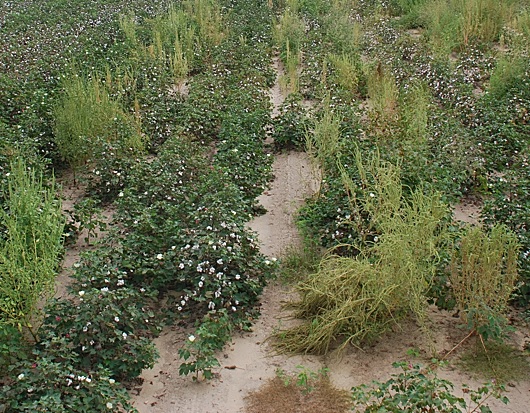Trouble is brewing for King Cotton, and it goes by the name of Roundup-resistant Palmer amaranth, aka the dreaded pigweed.
 image above: Palmer amaranth pigweed (r. foreground) infesting crop of GE cotton (l. foreground)
From http://www.agweb.com/Blogs/BlogPost.aspx?PID=0115de87-b524-4434-bd4f-c899cf3e9021
image above: Palmer amaranth pigweed (r. foreground) infesting crop of GE cotton (l. foreground)
From http://www.agweb.com/Blogs/BlogPost.aspx?PID=0115de87-b524-4434-bd4f-c899cf3e9021
Some weed specialists are calling pigweed the worst threat cotton has faced since the boll weevil. Reports first started surfacing a few years back about cotton fields in Georgia getting hammered by a fast-growing, drought-resistant, incredibly prolific weed that scoffed at Monsanto's best attempts to quash it, but this summer, the pigweed menace has exploded.
From South Carolina's Times & Democrat
Palmer amaranth crowds out cotton plants, starving them of sunlight, nutrients and water, and is a very productive weed. Each female produces as many as 500,000 seedlings, meaning just one plant can birth an entire field.
Unlike other pests, pigweed can continue to grow an inch a day even without water, making it particularly adept during the drought gripping the region. It also thrives in hot weather, continuing to grow when temperatures top 90 degrees and other plants shut down.
The weed can even damage cotton pickers, the huge machines that pluck natural fiber from the cotton bolls.
The rapid spread of the resistance has "absolutely shocked" [University of Tennessee weed specialist] Larry Steckel. "It's hard to believe how quickly and strong the resistance has become and spread."
Having been an Arkansas Extension weed specialist for years, Ken Smith thought he'd "quit being surprised at what weeds are capable of. But, let me tell you, these resistant pigweeds are so much worse than we thought they'd be."
How did this happen? Simple -- over-reliance on a single herbicide -- Roundup -- used in conjunction with genetically modified cotton that included built-in resistance to Roundup. Both products, incidentally, brought to you by Monsanto. At first, it seemed like a great deal for farmers. Plant the cotton, douse the field with Roundup, and watch everything besides the cotton seedlings die. But just as many scientists have long predicted, monocrop agriculture in combination with reliance on just one herbicide turned out to be the most effective way to develop super-weeds that would spit in Roundup's face that farmers could have devised.
There are a host of other deadly chemicals that can be applied, and experts are hard at work across the South devising strategies to contain pigweed devastation. They'll probably come up with something -- either that, or cotton's tenure in the South might be over. But if one of the main reasons why farmers were paying extra for Roundup-ready cotton was because of Roundup's efficiency at killing off everything else, you have to wonder if those same farmers still think the premium grade seeds are worth their high price. And you also have to wonder if anyone is listening to the bottom-line message: that relying on a single solution -- one strain of seed, or one brand of herbicide -- is inherently risky.
1 comment :
Well duh! What did we expect? For years we have had antibiotic resistant bacteria problems as a result of widespread antibiotic use. This is a very similar situation of using a chemical to broadly kill all weeds and then expect the weeds not to try and find a way to survive by becoming resistant (to Roundup). Did we really think we could have a "magic bullet" and that this would be different? What will happen when 10-20 years down the road we find out there are health problems associated with consuming GMO products in our food or fed to our meat and dairy animals? By then, there is a good possibility that GMO plants will have cross bred with non-GMO and we may never be able to have a pure non-GMO product again. We are shooting ourselves in the foot with this one...meanwhile these large corporations get rich off the GMO technology. When GMO cross breeds with traditional crops, the farmers' crops are contaminated and then the farmers are prevented from either having purity of their seed or saving their seed to use for the next season's crops. I can imagine that these "super weeds" will also begin to spread to areas where they have never been before. Talk about having problems with "invasive species" - that problem will pale in comparison to the invasion of these resistant weeds. We will all suffer the consequences of the actions of a few.
Michelle Blake, M.D.
Post a Comment